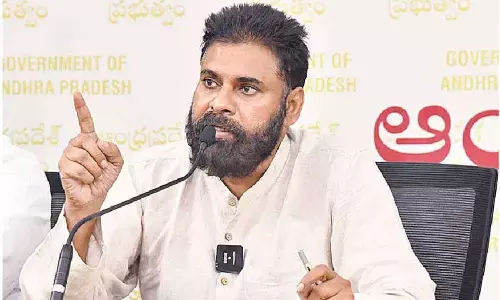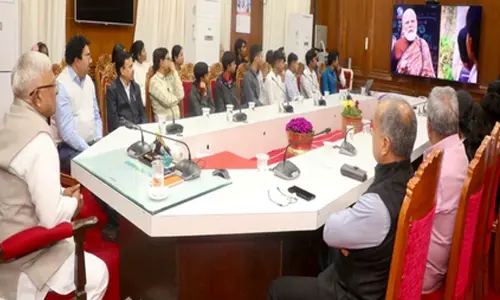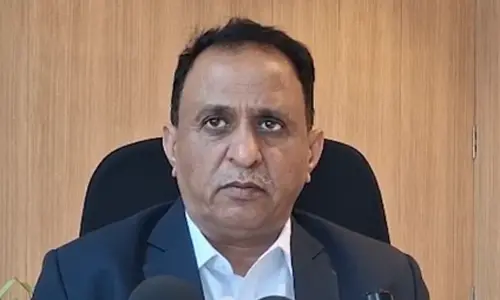Prime Minister’s Economic Advisory Council ’s blurred vision

Notwithstanding Prime Minister’s Economic Advisory Council (EAC) making moves to revive the economy, there are other departments that possibly are working at cross purposes.
Notwithstanding Prime Minister’s Economic Advisory Council (EAC) making moves to revive the economy, there are other departments that possibly are working at cross purposes.
The focus of the new policy has to be the rural self-reliant economy. It would create jobs, reduce dependence on government, doles, reactivate the economy, and generate demand.
Not much should be read into the higher tax collections. It is largely the impact of the implementation of the Seventh Pay Commission recommendations and some stray pay hikes in the corporate.
Overall direct tax gains now at Rs 3.86 lakh crore, said to be 16 per cent higher, is not that a large amount. It was Rs 4.06 lakh crore last year but also had Rs 79, 600 crore refunds between April and September 2016. The annual refunds are over Rs 1 lakh crore.
The EAC has not included direct tax abolition in its ten-point action plan. It includes economic growth, employment and job creations, informal sector and integration, fiscal policy, public expenditure, institutions of economic governance, agriculture and animal husbandry, patterns of consumption and social sector.
During his monthly pragati meeting in September 2016, Prime Minister Narendra Modi told the CBDT that taxpayer complaints (tax terror) had gone up. Income tax hardly raises kitty for the government. It increases tax administration cost and rent seeking. To reduce corruption, its abolition should be a priority. The biggest bane of income tax is sharp reduction in purchasing capacity. It suppresses demand all over.
Somehow despite rise in prices, there is a tendency to ignore it as statistics show otherwise and the EAC must take serious note of it. Some of the inflation is fueled by decisions of different government departments. These include rail fares, fuel charges, metro fares, highway and other tolls, parking charges, surreptitious raise in phone tariffs, continuous rise in bank and compliance charges. These all are inflationary.
The Aadhaar link has an additional cost on compliance costs at all levels, The EAC has to advise the government to trust people and futility of surveillance of every individual. It is against the concept of security.
It has missed an important aspect. It has decided to look at government expenditure but it has not taken any view on public transport policy and needs to keep its fares low. In Delhi, number of buses, as per government report, is coming down every two months though riders are increasing.
Sharp metro fare hikes have reduced one lakh metro riders, soon after the June hike and more after the October 10 hike. They are shifting to rickety DTC bus services and those who can afford are commuting by private cars choking vehicles. The solution is not in sharp parking charge hikes. That helps the mafia and adds to inflation.
It was expected that the EAC would try to remap the economy and change its focus. Agriculture and animal husbandry remains its third last priority. It has to change. Further, EAC chief Bibek Debroy was candid on many issues including whether jobs can rise or not during his press briefing.
This only hints at the critical situation. Job creations take time and linked to gradual improvements. The EAC has not yet considered how to make the farm sector the base of the economy. Jobs cannot be created by reducing most of the 75 crore farm jobs.
Of course, changing tack needs time.
Unless the focus changes to farm and rural sector, the policy planners always would be in dilemma. It needs a detailed discussion and new framework. Rural industries, khadi and the farm sector have to re-integrate to create self-sufficient villages.
The EAC has to chalk out how MNREGA and direct benefit transfer funds could be utilised to have self-sufficient villages that would not be dependent on the government or the corporate sector. Pricing of farm products is another key issue.
The revival of the rural economy is a must. Not so long ago, urban workers were looking to the village homes for their financial support. It has changed of late. The trend has to be reversed. The villages must not be begging.
It looks like the EAC is in a tearing hurry. The reorientation from the British induced industry and corporate fixation is not easy. Various lobbies that have enormously grown at the exploitation and ignorance of the rural sector would not like this.
These lobbies are demanding stimulus once again, even as the post-2008 stimulus has ruined the banking sector. Now that is being sought to be compensated with farm-loan waivers. None of these is practical. On the one hand, industry stimulus robs the banks and on the other farm-loan waivers rob the exchequer. There are benefits for political parties, but real farmers get little.
The EAC has been wise enough in rejecting stimulus. It, however, has yet to come out with a detailed roadmap. One problem is that it wants to do too much to keep too many happy. Attending to ten different aspects would never be possible.
It should seriously consider not keeping its hands full. In fact, it need not ignore industry as also the informal sector – closely linked to the rural and semi-urban economy – but all the same has to find out the moorings of Indian economy in villages.
Debroy distrusts job figures and is right to an extent. It is found that from July 2014 to December 2016, in the eight major sectors – manufacturing, trade, construction, education, health, information technology, transport, and accommodation and restaurant – only 6.41 lakh jobs were created against 12.8 lakh jobs from July to December 2013.
The Prime Minister’s Employment Generation programme (PMEGP) created 24.4 per cent less jobs in new micro enterprises and small projects, from 428,000 in 2012-13 to 323,362 in 2015-16.
The Economic Survey (2016-17) indicates that casualisation of jobs has adversely affected wages, employment stability and social security of the workers. The new schemes have not added to entrepreneurship much. The task is onerous. The EAC has to focus on a new economic vision and set fresh standards.
By Shivaji Sarkar














